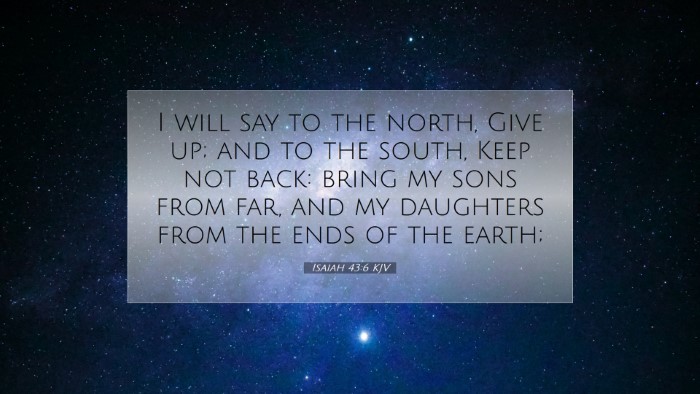Commentary on Isaiah 43:6
Verse: Isaiah 43:6 - "I will say to the north, Give up! And to the south, Do not keep back; bring my sons from afar and my daughters from the end of the earth."
Introduction
Isaiah 43:6 is a proclamation of God’s intention to gather His people from all corners of the earth. This passage reflects themes of redemption, restoration, and the assurance of God’s fidelity to His covenant people. It is often explored in light of the broader narrative of Israel's history and the prophetic hope found within the text.
Historical Context
Matthew Henry highlights the context of Isaiah's prophecy during the Babylonian captivity, where Israel finds itself estranged and in despair. In this situation, God speaks words of comfort and assurance, promising to gather His exiled people back to their homeland. This promise is not merely geographical but spiritual, representing a restoration of relationship with God.
Divine Sovereignty
Albert Barnes emphasizes God's sovereignty in the act of gathering His people. The command to the north and south signifies the divine authority over creation. God’s sovereignty ensures that every barrier—be it geographical, cultural, or spiritual—will be overcome for the sake of His people. It reflects God's might and His ultimate control over human affairs.
The Significance of "Sons" and "Daughters"
Adam Clarke provides insight into the terms "sons" and "daughters". These expressions convey not only a familial bond but also an identity that underscores the relationship between God and His people. The use of familial language denotes love, belonging, and the collective identity of God’s people as His children. It invites believers to reflect on their belonging in God’s family.
Geographic Imagery
The imagery of direction—north, south—carries significant meaning in biblical tradition. Matthew Henry notes that these directions symbolize the far reaches of the earth, indicating that no place is beyond the reach of God’s redemptive hand. This theological stance affirms the omnipresence of God, as He actively seeks out those who are lost and estranged.
The Promise of Restoration
Isaiah 43:6 encapsulates a promise of restoration. Albert Barnes reflects on this restoration not just in terms of physical return but also spiritual renewal. God’s call to His people is an invitation into a renewed covenant relationship. This assurance is particularly relevant for students and pastors today, as it speaks to the hope of restoration available in Christ, a theme echoed throughout Scripture.
Theological Implications
In theological discourse, the implications of this verse resonate well with the themes of redemption and covenant. Matthew Henry articulates that God's intervention in history to gather His people serves as a typological foreshadowing of the ultimate redemption found in Jesus Christ. The New Testament echoes this theme, where Christ calls out to His followers, inviting them into relationship and wholeness.
Application for Today's Believer
This verse carries profound application for contemporary believers. Adam Clarke suggests that the urgency of God's call to 'give up' and 'do not keep back' serves as a reminder of His relentless pursuit. For pastors and theologians, this affirms the mission of the Church—to seek and gather people into the embrace of God. It challenges believers to reflect on their role in evangelism and community building.
Conclusion
Isaiah 43:6 paints a vivid picture of God's unwavering commitment to His people, resounding promises of restoration, and the profound relationship believers share with Him. As we consider the insights from public domain commentaries, it becomes evident that understanding this text enriches our theological frameworks and pastoral practices. It strengthens the believer's assurance of God's sovereignty, love, and the ultimate hope we have in Him.


